We all know that menopause is when a woman stops getting her period. However, we do not realize that this does not happen overnight and that it involves a long, gradual process of bodily changes.
But at what age does menopause start, really? When are symptoms considered menopausal symptoms? Find out the answers to these questions and menopause symptoms and treatments in this article!
1) What Is Menopause?
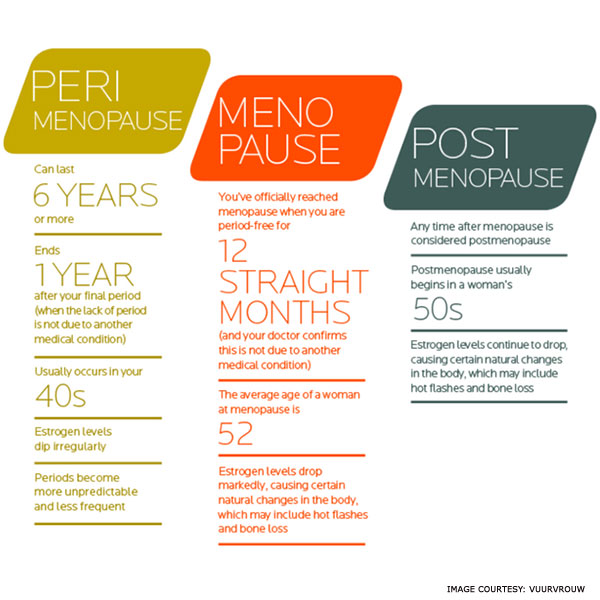
Menopause is defined by a natural occurrence marking the end of a woman’s reproductive life and menstrual cycle when she stops having her periods for at least 12 months straight but is not sick or pregnant.
It occurs when the estrogen levels and other female sex hormones in the blood drop and your ovaries cease doing their function by releasing egg cells. This is when the childbearing age and capacity of a woman comes to an end.
2) What Are The Symptoms Of Menopause?
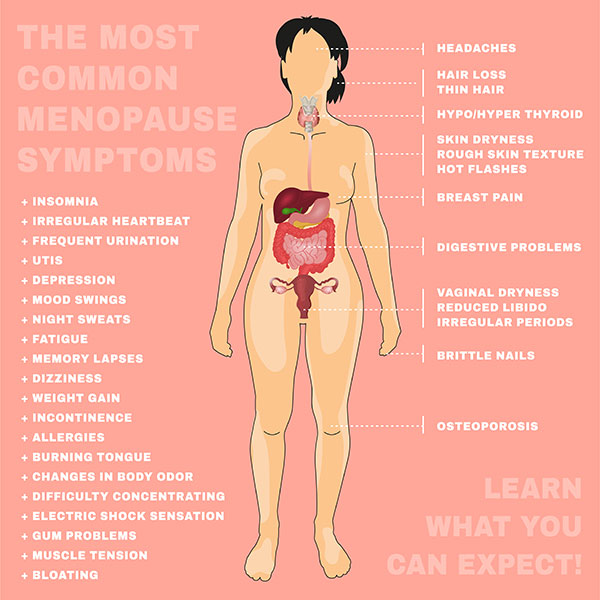
The first signs of menopause are often experienced months or years before the actual menopausal stage. Some women experience these symptoms long after their periods have stopped. Most women have several of these symptoms at a time while some do not experience them at all.
These signs and symptoms include the following:
B. Absent Periods
C. Periods that are heavier or lighter or last longer or shorter than normal period.
D. Hot flashes and night sweats
E. Sleeping problems
F. Irritability
G. Mood swings
H. Worsening of depression or anxiety symptoms
I. Fatigue
J. Unusual hair growth on the chest, abdomen, chin, or upper lip
K. Forgetfulness
L. Loss of sexual interest or inability to be aroused
M. Vaginal dryness, pain, itching, yeast infection and/or irritation
N. Urinary incontinence and increased risk of urinary tract infections
O. Weight gain
P. Thinner and drier skin and hair
Q. Development of more fat around the waist.
R. Stiff and painful joints due to decreased bone density
RELATED: Have You Ever Heard A Girl Went Through Menopause When She Was Just 17
3) At What Age Does Menopause Start?
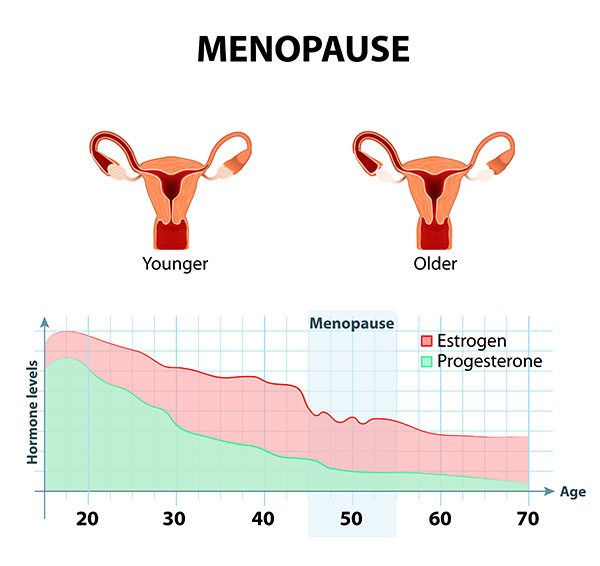
In the U.S., the average age of when women reach menopause is 51 years old. The common age of menopause varies between 48 to 55 years old. However, symptoms can occur long before that, and some women undergo this change much earlier.
The menopausal transition phase called perimenopause may start in your late thirties (premature menopause) or mid-forties. The most common symptoms of menopause at 46 are hot flashes and irregular periods.
There is also no way to exactly know at what age does menopause start and when you are undergoing menopause, but you should pay attention to your body and try to notice the changes that it undergoes. The symptoms and the start of menopause also vary depending on multiple factors.
4) How Long Does Menopause Last?
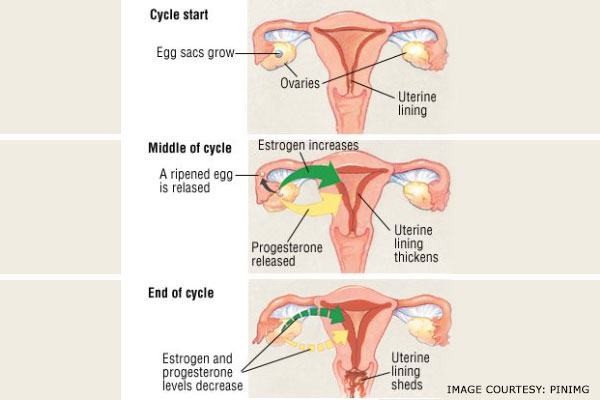
Now that you know at what age does menopause start, you have to understand that it is not in itself a process but a first period in a woman’s life. Often, when a woman does not get her period for 12 consecutive months, it will not come back again. This is the point where she has reached the post-menopausal stage.
However, the process wherein the estrogen and progesterone levels start to decline in preparation for menopause, the peri menopause stage, can last for up to 10 years or longer. This is when signs and symptoms usually start to occur. According to the North American Menopause Society, peri menopause lasts for around four to eight years on average.
5) Causes Of Early Menopause
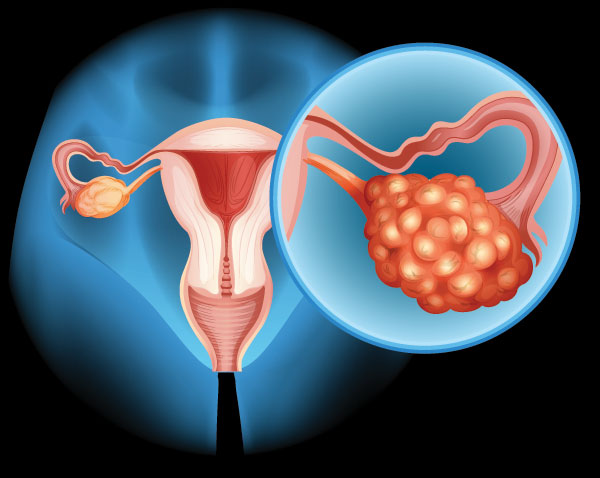
Some women undergo the menopause and the transition at a much earlier age. This condition is called premature or early menopause. What age does menopause start may be affected by the following:
A. Premature Ovarian Failure
Women with premature ovarian failure experience menopause before they even turn 40 years old. This condition affects about 1% of all women and may be associated with genetic factors or autoimmune diseases.
B. Ovarian Cancer
Ovarian cancer can hinder the normal functioning of the ovaries.
C. Cancer Radiation Therapy And Chemotherapy
These types of cancer therapy can induce earlier menopause when administered to an ovulating woman. Therefore, menopause symptoms may start during or shortly after the treatment.
D. Smoking
Women who smoke have been found to experience menopause symptoms slightly earlier than those who don’t.
E. Never Being Pregnant
A recent study on more than 51,000 women from Japan, Australia, the UK and Scandinavia has reported that women who have never been pregnant or had children had a twofold higher risk of premature menopause.
F. Getting Your Period Very Early
Women are born with only a certain number of premature egg cells. Menopause occurs when a woman’s egg reserve has been exhausted. Therefore, women who have had their first periods at a young age of 11 years or younger are more likely to experience premature or early menopause.
G. Living In High Altitude Places
Several studies have shown that women living at high altitudes such as those in the Andes or Himalayan mountain ranges undergo the natural menopause one to one and a half years earlier than those who live at lower altitudes. It is not clear whether this change is due to genetic, racial, socioeconomic, environmental, or lifestyle differences.
Surgical menopause or menopause induced by the surgical removal of the ovaries
Oophorectomy or the surgical removal of the ovaries that may or may not be done together with a hysterectomy or the removal of the uterus will lead to an immediate menopause called induced or surgical menopause. In this case, perimenopause is not experienced, and the signs and symptoms of menopause often occur immediately after surgery.
However, if a hysterectomy is performed without the removal of the ovaries, an ovulating woman is still capable to normally produce hormones with the absence of menstruation until the natural menopause occurs. When this happens, the symptoms are not due to the cessation of menstruation but the hormonal imbalance levels. Otherwise, premature ovarian failure may occur one to two years after a hysterectomy and a woman may not experience menopause symptoms at all.
6) How To Manage Menopause Symptoms

While it is almost impossible to prevent most menopause symptoms, there are ways by which you can reduce their frequency and severity or make them more bearable. Talk to your doctor about which methods may be best for you.
Try getting a hormone treatment or therapy which involves taking estrogen and progesterone to reduce symptoms associated with low hormone levels like hot flashes and vaginal dryness. Hormone therapies can also reduce the risk of ischemic heart disease.
A. Maintain a healthy lifestyle. Eat a balanced diet and exercise regularly to manage your weight. Once you reach your appropriate weight, work hard to maintain it.
B. Try yoga, meditation, or other fun activities that you enjoy to relieve your stress and control your mood better.
C. Consult a dietician about how you can properly portion and plan your meals to ensure that you’re getting your required nutrients.
D. If you smoke, now is a good time to quit.
E. Develop good sleeping habits by getting more regular sleep and keeping gadgets or your TV out of the bedroom.
F. Avoid caffeine after 12 noon if you have problems sleeping or staying asleep. You may also try warm baths to soothe and calm your body before bed.
G. Reduce your alcohol intake to help you sleep better and manage your weight.
Try natural remedies or treatments like black coho sh to minimize your symptoms.
Find a support group consisting of other woman undergoing or who have gone through menopause to be inspired and have access to solutions or answers to your concerns.
So at what age does menopause start? Menopause symptoms can naturally occur as early as your thirties, but actual menopause happens by the time you reach your mid-forties or early fifties.
While you cannot really avoid or know when menopause symptoms hit you, there are ways by which you can manage them. For the meantime, pay attention to how your body feels and the changes it undergoes. If you have concerns, consult your doctor or a friend or relative who has already experienced menopause.
“Hope you find the post helpful and we are excited to hear what you think of it!”






